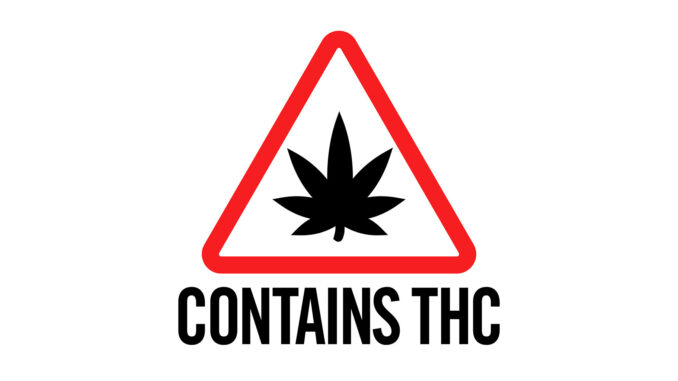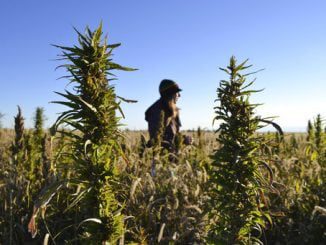
If you have traveled much around North Carolina, or even just around the corner, you have probably seen roadside signs and storefront windows advertising “legal weed.” How is that possible when cannabis is a controlled substance in this state? This is because of the rise of the intoxicating hemp industry, a new subsect of cannabis that has emerged from loopholes in the 2018 Farm Bill.
The bill defined hemp based on the quantity of delta-9 THC. Currently, federal legislation allows hemp products with a delta-9 THC concentration of not more than three-tenths of one percent (0.3%) on a dry weight basis. This definition has caused the rapid evolution of hemp products currently sold in convenience stores. These products are untested, unregulated, and untaxed while still providing an intoxicating effect to all buyers 18 years old or older.
Products being shipped into this state without adequate testing and regulation risk a public health crisis where North Carolina consumers do not know what else may be in the products they are ingesting.
To address this issue, some of my fellow legislators have sponsored HB 563 to regulate products derived from hemp t
o prevent untested and potentially harmful substances from being sold, especially to children. The bill would ban the use of hemp products in schools and the sale or use of these products by anyone under 21. The bill would also ban cartoon advertising or fraudulently labeled products, like cereals and candies, that appeal to children.
In addition to hemp products, this bill adds kratom, xylazine, and tianeptine, commonly sold over-the-counter intoxicating substances, to the controlled substance list, which would ban their sale without a prescription and medical supervision.
Since being sworn into office my motto on legislation has been “good policy doesn’t hurt innocent people.” Currently the lack of regulation of these products has the potential to harm many North Carolinians. In addition to addressing the need for regulation of these products, this bill also establishes a framework for regulating medical cannabis, including licensing requirements and safety measures to ensure products are safe for consumers.
In the time since medical cannabis was first brought up this biennium, two upcoming federal changes make the need for action by the North Carolina legislature even more urgent.
First, the federal government intends to reschedule marijuana from a Schedule I to a Schedule III substance, which could have implications for the way states regulate and prosecute current marijuana laws. Under existing state law, any Federal rescheduling of cannabis would automatically take effect in NC as well, unless a board appointed by Gov. Cooper chooses to intervene.
Secondly, the 2024 Farm Bill is set to revise the definition of hemp so that products containing any amount of THC would be classified as marijuana products. This may cause the federal government to view North Carolina as an unregulated market, leading to federal regulators under U.S. Attorney General Merrick Garland taking action to decide the issue for NC citizens.
While some are criticizing HB 563 because of the legalization, regulation, and taxation of medical cannabis, on balance, the bill provides a great deal more oversight and protection of NC consumers than the current regulatory environment. The fact of the matter is that intoxicating cannabis products are being sold across the state right now but without strong regulatory frameworks and consumer protections.
Not to mention the dangers of letting the federal government dictate policy regarding medical cannabis. North Carolina’s duly elected representatives should be the ones deciding this matter.
Further, the bill has important fiscal upsides that North Carolina is currently losing out on due to the unregulated market. Some economists believe the national hemp market reached $2.8 billion in 2023.
In North Carolina, the hemp component of HB 563 requires a retail tax of 10.5%. Additionally, the medical cannabis component of the legislation requires a 10% tax for all licensed and regulated cannabis retailers based on gross revenue.
Arkansas is already doing this with a reported $283 million in sales in 2023, resulting in medical cannabis sales tax revenue estimated at $31 million. Inevitably, North Carolina’s medical patients will exceed these figures, as its current population is estimated at twelve million.
North Carolina Legislative leaders should act now to pass HB 563. The bill, while setting up a tightly controlled medical cannabis program in NC, will increase consumer safety in our state by banning the sale of hemp to those under 21 and ensuring that any hemp products that are sold are safely manufactured and distributed so that NC consumers have confidence in the products that they are ingesting.
Suppose our legislative leaders fail to act to set up a controlled marketplace. In that case, NC citizens may well be at the mercy of the Cooper and Biden administration regulators as to what products may be sold in our state. NC Legislators must set up their own framework to ensure that the people’s elected representatives have the final say over what is legal in our state.
Rep. Allen Chesser (R-Nash) is a member of the N.C. House of Representatives and sits on the House Health Committee.


